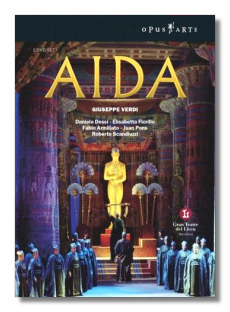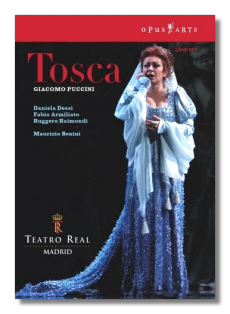
The Internet's Premier Classical Music Source
Related Links
-
Puccini Reviews
Verdi Reviews - Latest Reviews
- More Reviews
-
By Composer
-
Collections
DVD & Blu-ray
Books
Concert Reviews
Articles/Interviews
Software
Audio
Search Amazon
Recommended Links
Site News
 DVD Review
DVD Review
Opus Arte DVDs

Giuseppe Verdi
Aïda
- Aïda: Daniela Dessi
- Radames: Fabio Armiliato
- Amonasro: Juan Pons
- Amneris: Elisabetta Fiorillo
- The King: Stephano Palatchi
- Ramfis: Roberto Scandiuzzi
Orchestra & Chorus of the Gran Teatre del Liceu/Miguel Ángel Gómez
Stage Director: Jose Antonio Gutierrez
BBC Opus Arte OA0894D 2DVDs LPCM Stereo Dolby Digital DTS Anamorphic Widescreen


Giacomo Puccini
Tosca
- Tosca: Daniela Dessi
- Cavaradossi: Fabio Armiliato
- Scarpia: Ruggero Raimondi
- Angelotti: Marco Spotti
- Sacristan: Miguel Sola
- Spoletta: Emilio Sanchez
- Sciarrone: Josep Miquel Ribot
Orchestra & Chorus of the Teatro Real/Maurizio Benini
Stage Director: Nuria Espert
BBC Opus Arte OA0901D 2DVDs LPCM Stereo, DTS 5.1, Anamorphic Widescreen
One hardly needs to point out that these two masterpieces are not only among their respective composers' most popular operas, but among the most popular on the world's stages today. Both productions here feature Daniela Dessì and Fabio Armiliato in the lead roles, and in both they sing beautifully and with the requisite dramatic skills. But the pair hardly dominate the proceedings, since they are surrounded by many talented singers in these well-cast efforts. Moreover, there is so much to admire in the production values here that the ear is often distracted by what captivates the eye: both Opus Arte issues give you better than front-row seats with their splendidly-realized camera work.
Aïda was recorded in July, 2003 in Liceu at the Gran Teatre, while Tosca comes from performances in January, 2004, at Madrid's Teatro Real. Aïda is more colorfully staged, with brighter sets, lots of pageantry and a more epic sense, while Tosca is appropriately darker, both in lighting and in its overall tragic character. What might be a little controversial in the Tosca here is stage director Nuria Espert's decision to portray Scarpia as a Bishop. I'm not sure why the police chief was given cleric's robes, but the character transformation does not damage the dramatic thrust of the story.
As suggested above, the singing in both operas is excellent. The big numbers especially come off well: in Tosca Fabio Armiliato's Recondita Armonia is beautifully performed, while Raimondi's Tre sbirri is tremendously effective and Dessi's Vissi d'arte powerfully moving. The other cast members are also convincing, and the orchestra and chorus respond with spirit and polish to Maurizio Benini's incisive baton. The sound is vivid.
In Aïda, the lead singers are also quite effective, The choral work was especially excellent too: try the atmospheric singing at the opening of Act 3 or the triumphant Su! Del Nilo al sacro lido near the end of the opera's first scene. Armiliato's Celeste Aïda is beautifully sung and Dessi's O patria mia is equally moving, but then I could go citing further highlights of theirs. Juan Pons' Amonasro and Elisabetta Fiorillo's Amneris are also fully convincing and well sung. Miguel Ángel Gómez draws splendid playing from the orchestra and the sound is excellent.
Opus Arte offers a bonus with its Tosca set – substantial interviews with Dessì, Armiliato, Raimondi and conductor Benini. Of the fifteen or twenty DVDs I've reviewed in the last year or so, these two rank with the best, Zeffirelli's Carmen and Francesca Zambello's production of Prokofieff's War and Peace. Needless to say, despite the fact that you can find better (though not much better) Aïda s and Tosca s on CD, these two Opus Arte issues can be highly recommended.
Copyright © 2004, Robert Cummings



















